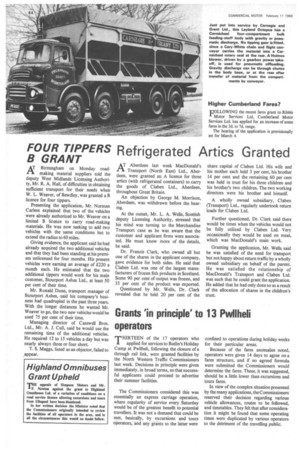FOUR TIPPERS Refrigerated Artics
Page 46

If you've noticed an error in this article please click here to report it so we can fix it.
Granted
B GRANT
Ar Birmingham on Monday roadmaking material suppliers told the deputy West Midlands Licensing Authority, Mr. R. A. Hall, of difficulties in obtaining sufficient transport for their needs when W. L. Weaver, of Bewdley, was granted a B licence for four tippers.
Presenting the application, Mr. Norman Carless explained that two of the vehicles were already authorized to Mr. Weaver on a limited B licence to carry road-making materials. He was now seeking to add two vehicles with the same conditions but to extend the radius to 60 miles.
Giving evidence, the applicant said he had already acquired the two additional vehicles and that they had been standing at his premises unlicensed for four months. His present vehicles were earning an average of £220 a month each. He estimated that the two additional tippers would work for his main customer, Stourport Ashes Ltd., at least 50 per cent of their time.
Mr. Ronald Dunn, transport manager of Stourport Ashes, said his company's business had quadrupled in the past three years. With the longer distances he wanted Mr. Weaver to go, the two new vehicles would be used 75 per cent of their time.
Managing director of Casswell Bros. Ltd., Mr. A. J. Cull, said he would use the remaining time of the additional vehicles. He required 12 to 15 vehicles a day but was nearly always three or four short.
T. S. Maggs, listed as an objector, failed to appear. Aberdeen last week MacDonald's Transport (North East) Ltd., Aberdeen, were granted an A licence for three artics (with refrigerated containers) to carry the goods of Claben Ltd., Aberdeen, throughout Great Britain.
An objection by George M. Morrison, Aberdeen, was withdrawn before the hearing.
At the outset, Mr. L. A. Wells, Scottish deputy Licensing Authority, stressed that his mind was turning to the Merchandise Transport case as he was aware that the customer and applicant firms were associated. He must know more of the details, he said.
Dr. Francis Clark, who owned all but one of the shares in the applicant company, gave evidence for both sides. He said that Claben Ltd. was one of the largest manufacturers of frozen fish products in Scotland. Some 90 per cent of output was frozen, and 35 per cent of the product was exported.
Questioned by Mr. Wells, Dr. Clark revealed that he held 20 per cent of the share capital of Claben Ltd. His wife and his mother each held 3 per cent, his brother 14 per cent and the remaining 60 per cent was held in trust for his three children and his brother's two children. The two working directors were his brother and himself.
A wholly owned subsidiary, Claben (Transport) Ltd., regularly undertook return loads for Claben Ltd.
Further questioned, Dr. Clark said there would be times when the vehicles would not be fully utilized by Claben Ltd. Very occasionally they would be used on meat, which was MacDonald's main work.
Granting the application, Mr. Wells said he was satisfied of the need for transport but not happy about return traffic by a wholly owned subsidiary on behalf of the parent. He was satisfied the relationship of MacDonald's Transport and Claben Ltd. was such that he could grant the application. He added that he had only done so as a result of the allocation of shares in the children's trust.




























































































































